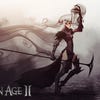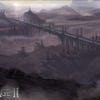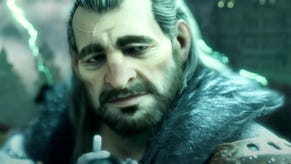Dragon Age 2
Dark respawn.
We strongly advise against reading the things people write about you on the internet. It is, as Peter Mannion once said on The Thick of It, "like opening the door to a room where everybody tells you how s*** you are." Nevertheless, emboldened by the hugely positive response to Dragon Age: Origins, BioWare has been on forums seeking inspiration for the sequel.
Apparently this has resulted in a single, core principle that sits at the heart of Dragon Age 2. The idea is to improve the things that worked, fix the things that were broken, and use your comments on the game over the past year as a starting point. In other words, if you don't like the results, you've only got yourself to blame.
Dragon Age 2 is much more than a patch for the first game. It's a whole new story, following the ascent of protagonist Hawke from the days of his escape from Lothering right up to his victory at Kirkwall in the Free Marshes - actions that make him the most important individual in the Dragon Age universe, according to the developers.
In a way it's two whole new stories, because the game uses a framed narrative. "It's this notion of a story that's being told by another story," says the producer. "For example, Assassin's Creed is not about Altair in the Middle Ages - it's about this guy Desmond in the future trying to find out more about his past."
In Dragon Age 2, the tales of Hawke's exploits are really being told by a hairy man sitting in a throne taunting a woman called Cassandra. She's a chantry seeker on Hawke's trail for reasons we'll find out later. "What you're playing is an exaggeration of the real story," we're told. "It's your myth. You're quintessential in Dragon Age lore and Hawke's rise to power changes the whole Dragon Age history."
Unlike Assassin's Creed though, the game sometimes revisits things it's already done to clarify details. In our demo, for example, the narrator exaggerates tales of Hawke and his sister Bethany's flight from Lothering to make it sound like they single-handedly defeated a horde of Hurlocks - only for Cassandra to literally call "bulls***" on it and demand the real version, which we then see as well.
BioWare says another advantage of the framed narrative is that the game can span more time - 10 years in this case compared to Origins' one. "You're not going to play all the boring bits in the middle of the fun things," apparently. The condensed timeline will also mean that decisions you make early in the game appear to bear fruit sooner, so you're less likely to do something meaningful then forget about it by the time it pays off.
The visuals and interface are a terrific improvement over the slightly lacklustre ports of Origins. We didn't even realise we were watching the Xbox 360 version for a few minutes until we were told. Upon switching to PC it's another boost. Both versions also benefit from BioWare's decision to change the art direction.
"Origins had an issue where you'd see a screenshot and weren't sure where it was from," says the game's producer. "We made it a point from the beginning of Dragon Age 2 to give it its own style."
Combat has also been refined. Many of us loved the ability to pause the first game and plot your next move using the tactics menus, but this resulted in some players queuing up actions then wandering off and not really connecting with the battles themselves. "With Dragon Age 2 we're keeping the ability to think like a General, but we're adding the ability to fight like a Spartan," says the producer.
On-screen, Hawke - a male warrior for this demo - and Bethany, a mage - are taking on a stream of Hurlocks. Hawke's brutal attacks carve off legs and split enemies in half. It's almost hilariously violent. "If I never want to go into think-like-a-General mode, I don't have to," says the producer. "You don't have to use the pause-and-play mechanic. But they are there if you love that kind of thing."











